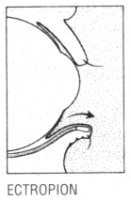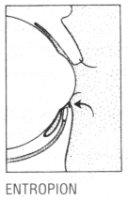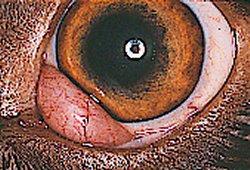| .kennel
di Ala D'Oro Bracco Italiano
.Jaap Muller & Tina Steffens |
|||
|
Eye
& Eye lid abnormalities
Open
eye:
Ectropion = (eye) lid curled outside The punctum is the drainage hole on each lid near the nose. As the lower eyelid droops the punctum is pulled away from its normal position. Tears do not drain naturally. As protection for the eye breaks down, irritation, inflammation, burning, itching and the deposit of debris will result. The eyes of a dog are continue irritated, witch give very painfully infections on the cornea. Without medical interaction this infections can lead to the total loss of the eye('s).
Entropion = (eye) lid curled inside: Ectropion is the term used when the lower eyelids sag and roll outwards exposing the inner conjunctiva. The eyes of a dog are continue irritated by the eye lid what is curled inside, witch give very painfully infections on the cornea. Without medical interaction this infections can lead to the total loss of the eye('s).
A prolapsed gland of the third eyelid (or "cherry eye") is thought to be associated with a laxity of a small ligament which holds the gland in a normal position behind the third eyelid. The gland is a tear producing gland, and produces about 30% of the tears, while the main orbital lacrimal gland produces the rest. Dogs that have had the gland of the third eyelid surgically excised have a greater risk of development of a dry eye (KCS ) than dogs with intact third eyelid glands. It is thought that should the main orbital lacrimal gland be damaged later in life that there is no "back-up" for tear production. Dry eye is a serious eye condition that is difficult to treat, and requires lifelong treatment which may be costly. If the chance of the development of a dry eye can be lessened by tacking the gland back into a normal position so that it stays functional, then this is the most desirable way of handling "cherry eye". |
|||
|
|
|||


